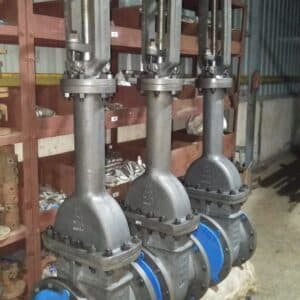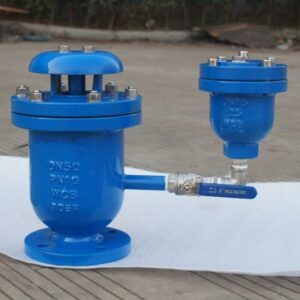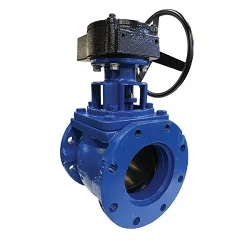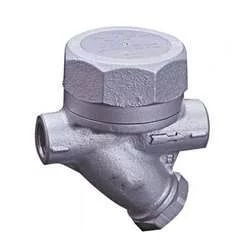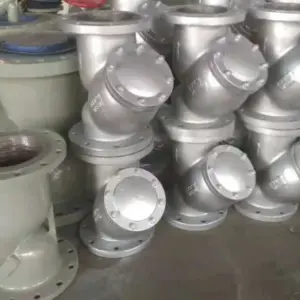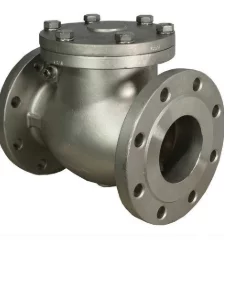In fluid handling and pump technology, foot valves are basic but vital devices. Most pump systems would not be able to maintain efficiency, stability, and uninterrupted operation without them. A foot valve can look like another check valve, but its location and operation in a pump system render it indispensable.
In this Valves Only blog, we will deconstruct the definition, purposes, operational principle, benefits, and applications of foot valves—describing why foot valves are employed in pumps systems, and why Valves Only is your best supplier for high-quality foot valves.
What Is a Foot Valve?
A foot valve is a check valve mounted on the inlet of a suction pipe or at the end of a pump line which is dipped in a fluid reservoir like a tank, well, or reservoir. It is used to enable liquid to move in one direction only—into the pump—and to avoid backflow when the pump is shut off.
The valve is equipped with a strainer or screen near the base to keep debris from entering into the pipeline so that only pure fluid will be pumped into the pump. Foot valves are usually constructed using materials like bronze, cast iron, stainless steel, or PVC, depending on the media and environment conditions.
How Does a Foot Valve Work?
Foot valves work on a check valve principle, i.e., they open when there is pressure in the forward direction (during the operation of the pump) and shut when pressure is lost (when the pump is turned off).
Step by step is as follows:
- Pump Starts: When the pump is started, it develops suction pressure.
- Foot Valve Opens: The vacuum or pressure pulls the fluid from the source, pushing the foot valve to open.
- Fluid Moves Upwards: The fluid flows into the suction pipe and is forced into the pump.
- Pump Shut Down: When the pump is shut down, suction ceases.
- Foot Valve Closes: The internal valve (disc or flap) closes by gravity or back pressure to avoid fluid flowing in the reverse direction. This self-closing action is what makes foot valves extremely effective in avoiding system failure and minimizing the danger of dry running.
Why a Foot Valve Is Applied in Pumping Systems?
Foot valves play a vital role in the efficiency, lifespan, and reliability of a pumping system. The reasons they are applied are as follows:
1. To Keep the Pump Primed
- Most pumps, particularly centrifugal pumps, must be primed prior to operation.
- A foot valve keeps the suction line full of fluid, avoiding repeated re-priming of the pump.
2. To Avoid Backflow
- When a pump is shut off, fluid may return to the source by gravity.
- Foot valves prevent reverse flow, which maintains pressure uniformity and energy savings.
3. To Minimize Wear and Tear
- Continuous re-priming or dry running may damage internal pump components.
- Foot valves keep fluid in the line, reducing mechanical stress, which improves the pump’s lifespan.
4. To Keep Contaminants Out
- The foot valve screen removes sediments, stones, and trash.
- This shields the pump impeller and enhances the overall efficiency of the system.
5. Energy Saving
- With stable prime and less backflow, pumps become more efficient with lower operational expenses.
Functions of a Foot Valve:
- Non-return operation for fluid to flow in just one direction.
- Retain prime in the suction line when not in operation.
- Filtration by built-in strainer or mesh screen.
- Shield pumps against dry running and cavitation.
- Regulate system pressure in pipelines.
Applications of Foot Valves:
Foot valves find extensive applications in:
- Irrigation systems for sucking water from ponds or wells.
- Municipal water supply systems for water suction and supply.
- Agricultural pumps to ensure prime in rural installations.
- Industrial pumping units to avoid backflow and extend pump life.
- Submersible and surface pumps for groundwater or borewell suction.
- Firefighting pumps to provide immediate water supply without re-priming.
Advantages of Foot Valves:
- Prevents Pump Damage: Avoids dry running and cavitation.
- Maintains Prime: Keeps the suction line full of fluid.
- Saves Energy Loss: Stops pump from starting dry, conserving power.
- Enhances System Efficiency: Reduced maintenance and smoother performance.
- Long Service Life: Durable materials for all types of applications.
- Prevents Contamination: Mesh screen keeps inside parts from clogging and wear.
Materials Used in Foot Valves?
- Stainless Steel: Corrosion-proof, suitable for aggressive fluids.
- Cast Iron: Economical and long-lasting for normal water use.
- PVC/Plastic: Low-cost and lightweight for irrigation or low-pressure systems.
- Bronze/Brass: Marine and brine-resistant against corrosion.
Installation Tips for Foot Valve:
- Always install vertically at the bottom of the suction line.
- Make sure the strainer is fully immersed in the fluid.
- Do not install in high-sediment areas unless employing a heavy-duty screen.
- Screen should be inspected and cleaned regularly for durability.
Why Choose Valves Only for Foot Valve?
Valves Only is a leading international manufacturer and supplier of high-quality industrial valves. We provide:
- Global Reach, Local Expertise: – We supply industries in Europe, Asia, the Middle East, and North America.
- Superior Engineering: – Our foot valves are made with precision machining and best-quality materials to deliver long-term performance.
- Wide Product Range: – We supply foot valves in a range of materials, sizes, and pressure classes to meet different applications.
- Compliance & Standards: – Our valves meet API, ANSI, ASME, DIN, and other international standards.
- Customer-Centric Approach: – We help customers choose the best valve for their system and provide complete technical assistance.
- Competitive Pricing: – Experience top-quality products at value-based prices—no compromise on quality.
Irrespective of whether you have an agricultural farm, a municipal plant, or an industrial plant, Valves Only stocks the appropriate foot valve to ensure your systems keep flowing.
Conclusion:
Foot valves are straightforward but essential pumping system components. By keeping your pump primed, backflow prevented, and contaminants blocked, they keep your pump running both safely and efficiently.
When you need durable, high-performance foot valves for a reliable operation, turn to Valves Only as your premiere supplier. Let our expertise provide the proper valve solution—regardless of your industry.
Recent Posts
- What Is a Steam Trap and How Does It Work?
- What Is a Foot Valve and Why Is It Used in Pumping Systems?
- BI-DIRECTIONAL VS. UNI-DIRECTIONAL KNIFE GATE VALVES: WHICH ONE DO YOU NEED?
- WHAT IS A DOUBLE BLOCK AND BLEED BALL VALVE? A COMPLETE GUIDE
- UNDERSTANDING THE DIFFERENT TYPES OF AIR VALVES: SINGLE VS. DOUBLE ORIFICE

